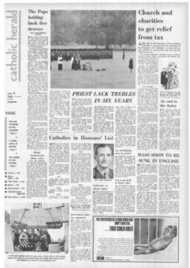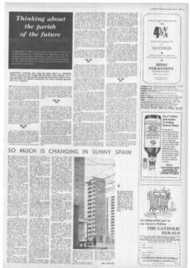Page 7, 17th June 1966
Page 7

Report an error
Noticed an error on this page?If you've noticed an error in this article please click here to report it.
Tags
Share
Related articles
1. 4 Pto Lip Or Not
A7cii7ic Workers' Notebook
Catholic Workers' Notebook
By
Sidetract
Hazards Of Picnicking The Picnic Is A Very British...
Why I am against tipping
Till: recent announcement
that a 12i per cent surcharge is to be impOsed on all meals eaten in British Rail establishments as a service charge has provoked much heated discussion on the topic of tipping in general.
As a starting point. it is in teresting to note that the expression to tip", meaning to give a gratuity. originated in what my dictionary describes rather loftily as "rogue's cant".
I do not wish to suggest that all those who look for tips, or even the majority of them, are rogues. At the same time, one cannot help suspecting that a certain amount of moral blackmail is occasionally practised by people hoping to receive a tip. especially in cases where the prospective donor is a woman.
In essence. a tip should be a reward for some service performed over and above what should normally be expected from someone carrying out the job he or she is paid to do. In circumstances where such extra service is given. no one minds expressing appreciation for it in the form of a tip. Unfortunately, however. in far too many cases tips now seem to be expected as a matter of right. even by those whose performance of their normal duties is casual and sloppy.
Here is where the blackmail comes in. Dare anyone, especially if she is a woman, fail to tip the surliest taxidriver? And what housewife has not heard of or. worse yet. personally experienced the retributive measures of untipped dustmen? It would be unthinkable to get a child's hair cut without tipping the hairdresser or to have a meal out without tipping the waiter.
There is no rhyme or reason to tipping in 1966. A couple of generations ago.,when there were vast financial gulfs between the poor and the rich. the servant and the served, the patronage of the tip was a natural outcome of the inequality of society. In Britain today, with the general levelling-off of the various strata of society and greater material prosperity all round. it is not an exaggeration to claim that, in many instances, the person from whom the tip is expected may be financially worse off than he on whom the tip is to be conferred.
It would seem to be high time that the whole archaic practice was abandoned. For, basically, tipping is a degrading process, a diminution of the human dignity of both tipper and tipped.
The great argument of those in favour of the retention of tipping is that in some occupations, the catering trade, for example, the wages paid do not afford a reasonable standard of living for the employees. But Trade Unions exist to negotiate living wages for their members. Surely it must be preferable to receive a just wage as a reward for one's labour than to be partially dependent upon
the generosity (however fictitious) of the individual customer?
A spokesman for British Rag tells me that the surcharge on meals is intended to replace a tip. Unfortunately there is a strong possibility that, as has happened before, a tip will still be expected in excess of the compulsory charge. The vicious circle must be broken somewhere.
A very new association formed with this express object in view is the Anti-Tipping Campaign. Mr. Michael Ellman founded it almost accidentally. Two months ago he wrote a letter to the Observer deploring the system of tipping. He was astounded at the response provoked by it. Over 200 letters encouraged him to launch his campaign which has now been formed into a legally constituted association.
Already many employers
and some Trade Unions have offered support to the campaign. Individual members of the association are provided with cards which they hand out in situations where a tip might normally be expected. On these cards is printed: "Thank you I do appreciate your services, but I have not left a tip. I believe that tipping is a patronising habit, and that you should receive a proper wage without having to rely on charity. Please pass this to your employer or union."
The Anti-Tipping campaigners hold that service charges are an improvement on tipping, but only where no tip is permitted in excess of them, as is the case with Trust Houses. However, even service charges are only a sort of second best. The true cost of the service should be included in the price of the meal, taxi fare or whatever. Only then can we achieve the equality of status worthy of a Christian community.
blog comments powered by Disqus











